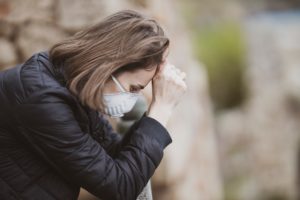
Recently there has been a lot of uncertainty growing with the COVID-19 pandemic, and many people are experiencing stress, heightened emotions, and grief that they have never experienced before. But how can you tell that you are currently struggling? There may be changes in your behavior or lifestyle that seem different, and you may not know how to handle them. Here are some signs that might indicate you need to seek support.
10 Signs You Might Need Support
- Changes in mood-anger, hopelessness, sadness, irritability
- Changes in behavior-not interacting with friends and family
- Lack of interest in activities you have previously enjoyed
- Sleep issues-can’t sleep, can do nothing but sleep, can’t stay asleep
- Changes in weight or eating patterns
- Problems with memory or concentration
- Changes in personal hygiene
- Increase in risky or reckless behaviors
- Thoughts of suicide
- Worsening of chronic health conditions
It is also important to note that there are certain demographics that fall under the increased need of support during this time. The people impacted most strongly may include:
- People of Color
- People at higher risk of a severe case of COVID-19 – older people and those with underlying medical conditions
- Care providers-family and professionals
- Essential workers
- Those with existing mental health disorders
- Those people who use substances to cope
- People who have lost their jobs
- People who are homeless
- People in congregate living
- People who are socially isolated
- People who speak English as a second language
If you are experiencing any of the signs above, or are a part of the demographic that may be experiencing high stress, your next step may be to learn how to cope with those emotions.
Healthy Ways to Cope With Stress
- Know what to do if you are sick and are concerned about COVID-19.
- Know where and how to get treatment and other support services and resources, including counseling or therapy (in-person or through telehealth services) and reach out if necessary.
- Take breaks from watching, reading, or listening to news stories, including those on social media.
- Take care of your body:
- Take deep breaths and stretch
- Try to eat healthy, well-balanced meals
- Exercise regularly
- Get plenty of sleep
- Avoid excessive alcohol and drug use
- Make time to unwind and try to do some other activities you enjoy.
- Connect with others and talk with people you trust.
- Connect with your community or faith-based organizations.
- While social distancing measures are in place, consider connecting online, through social media, or by phone or mail.
What Family Service Can Do For You
For our community during this time, Family Service of Roanoke Valley is offering up to 4 free short-term therapy sessions to people who may be feeling increased anxiety, fear, or depression caused by COVID-19 or by recent unrest in our communities. Sessions will be by video or phone and are open to anyone ages 10 or above.
After 4 sessions, referrals to other community resources will be offered.
To make an appointment call 540-563-5316, ext 4653.
Our Website: www.fsrv.org
References:
- What to Do If You Are Sick- https://www.cdc.gov/coronavirus/2019-ncov/if-you-are-sick/steps-when-sick.html
- Healthy Eating Tips-https://www.cdc.gov/nccdphp/dnpao/features/national-nutrition-month/index.html
- Physical Activity Basics-https://www.cdc.gov/physicalactivity/basics/index.htm
- Tips for Better Sleep- https://www.cdc.gov/sleep/about_sleep/sleep_hygiene.html
- Alcohol and Substance Use- https://www.cdc.gov/coronavirus/2019-ncov/daily-life-coping/stress-coping/alcohol-use.html

